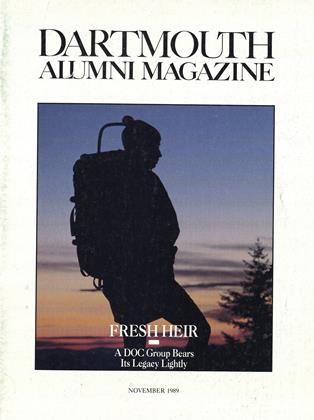In my 13 years as a foreign correspondent, the survival tips that got passed along to me pretty much distilled down to four basic rules: Don't travel with anything you can't carry at a dead run for a half-mile. Go to the bathroom whenever you get the chance. As soon as you land in the middle of a story, start figuring how to get yourself out. And never stand between a crowd and a hard place.
In the hope that the latter three rules seem self-explanatory, let me devote a little more time to dealing with the first. Many a seasoned traveler has been ambushed by surly porters, tardy arrivals for connecting flights, and vanishing suitcases. The best solution is less luggage. Such a philosophy grates with the Western man, who has been imbued since childhood with the desirability of acquiring more possessions than he needs.
"Are you departing the motherland permanendy?" their leader asked as he rummaged through the clothing. Our assurance that we were going on holiday for a mere two weeks did not convince him. After three hours of fruitless searching, the chief inspector wearily gestured us to repack our possessions, which by then were strewn up and down the Russian countryside. "You must learn to travel with less!" he snapped.
It was a warning I took to heart in the Middle East and Africa when I made midnight transfers at small airports notorious for gobbling up luggage. In time I learned how little I could get away with on the road, confining it to what I could carry, if not at a dead run for a half-mile, then at least a brisk trot for nearly that distance.
The trick of traveling light is surprisingly easy. Lay out on a bed every- thing that you think you will need for the journey. Then take as large a bag as you can manipulate, and start packing things in order of indispensability. When the bag starts looking full, put away whatever is left. The odds are you can get along without the rest.
It is useful to leave the hands unencumbered for airline tickets, passport, and currency transactions, which means using a carry-on bag with a strap. When our children were toddlers we started them out with backpacks for carrying their toys, books, and stuffed animals. I can still recall our son, then four years old, padding'sleepily through the cavernous railroad station in Leningrad with a teddy bear peeping out of his small pack, to the delight of the Russian onlookers.
I never considered using a backpack for my own travels until I began getting hauled aside by nervous security officials in the Middle East and Africa who wanted to know why I was carrying a typewriter and what precisely I planned to write. In one Arab country two plainclothed policemen tried to take my portable typewriter apart, believing it was a subversive mimeograph machine. Several colleagues warned me their typewriters had been confiscated in Libya, so when I went to Tripoli I tucked mine at the last minute into a backpack. Not only was I never harassed again but I also found I was even less encumbered. After I switched from a typewriter to a lap computer, I sometimes carried that in my backpack along with my cameras and notebooks. Anyone who deems a backpack downscale has not priced one of the better brands lately.
Though I sometimes include a small nylon bag to bring home any purchases, I learned a decade back that souvenirs can lead the best plans drastically astray. In Tunis, while covering an Arab League summit meeting, I went to the bazaar and, after lengthy bargaining, acquired a large white filigreed bird cage. I was booked to fly home to Cairo the next morning and reasoned that I would be only briefly bogged down. That same night my editors told me to change plans and proceed instead to Damascus, Syria, which I did rather clumsily, typewriter in one hand, bird cage in the other, and my small bag checked in the hold. Once in Damascus I was sent to Israel as fast as possible to arrive in Jerusalem before the historic visit of President Anwar elSadat of Egypt.
at first light over the mountains to Beirut, Lebanon, flashing my press cards and bird cage at puzzled gunmen manning the assorted roadblocks. From Beirut I found a flight leaving for Rome and caught the next plane from there back south to Israel. Eventually I arrived back in Cairo. Six countries in as many days with a bird cage. I wouldn't recommend it for serious light travelers.
Christopher Wren '57 covers South Africa for The New York Times.
 View Full Issue
View Full Issue
More From This Issue
-
 Cover Story
Cover StoryFresh Heirs
November 1989 By Heather Killerew '89 -
 Feature
FeatureMaking the Normal Less Normal
November 1989 By Warner R. Traynham '57 -
 Feature
FeatureThe Day I Got Chewed Out By Red Blaik
November 1989 By Rodger S. Harrison '39 -
 Feature
FeatureSILENT TOWER
November 1989 -
 Cover Story
Cover StoryA Woodsy Time Line
November 1989 -
 Cover Story
Cover StoryFashion Corner: Two Outing Club Looks
November 1989
Christopher S. Wren '57
Features
-
 Feature
FeatureHanover Has A Mardi Gras
APRIL 1973 -
 Cover Story
Cover StoryArms Limitations in Webster's Time
June 1989 -
 Feature
FeatureHARRIS
JUNE/JULY 1984 By Brad M. Hutensky '84 -
 Cover Story
Cover StoryPiece of the Action: The Stanfa Hit
OCTOBER 1994 By George Anastasia -
 Feature
FeatureThe 1957 Commencement
July 1957 By GEORGE O'CONNELL -
 Feature
FeatureCall of Duty
Sep - Oct By LISA FURLONG




